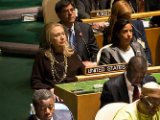Contested Commons: the Future of American Power in A Multipolar World
Jan 2010
By James Mulvenon, Abraham Denmark for Center for a New American Security (CNAS)
Executive Summary
The United States has been the primary guarantor of the global commons since the end of World War II. The U.S. Navy and Coast Guard have dissuaded naval aggression and fought piracy around the world, ensuring unprecedented freedom of the seas. The United States led the creation of international agreements on air transportation, enabling the creation of a global air industry. America also forged an international consensus on the openness of space, ensuring all countries with the means to do so can utilize orbital space for scientific, commercial and military purposes. Lastly, research funded by the U.S. government led to the creation of a decentralized network of connections now called the Internet, which connects physically dispersed markets, capital and people.
The United States derives great benefit from open access to these global commons, but so too does the world at large. Indeed, dependable access to the commons is the backbone of the international economy and political order, benefiting the global community in ways that few appreciate or realize. Today, over 90 percent of global trade, worth over 14 trillion dollars in 2008, travels by sea.(1) Civil air transportation carries 2.2 billion passengers annually and 35 percent of all international trade, by value.(2) Governments, militaries and corporations around the world rely on space for communications, imagery, and accurate positioning services, making space a 257 billion dollars industry in 2008.(3) Financial traders in New York City use the Internet to transfer 4 trillion dollars, greater than 25 percent of America’s annual GDP, every day.(4)
For the past 60 years, and especially since the end of the Cold War, America’s nearly unchallenged military advantage in the global commons has guaranteed their openness and stability. Yet, this dominance is increasingly challenged. New powers are rising, with some adopting potentially hostile strategies and doctrine. Meanwhile, globalization and technological innovation are lowering the threshold for states and non-state actors to acquire asymmetric anti-access capabilities, such as advanced anti-ship cruise missiles, anti-satellite weapons, and cyber warfare capabilities. The decentralization of military power and expanded access to technologies once reserved for superpowers will necessarily contest America’s 60-year-old dominance over the global commons and its ability to maintain their openness.
While disturbing on their own, these trends are developing concurrently with America’s growing reliance on the commons. Militarily, the United States increasingly relies on the commons to enable many aspects of its operations, from logistics, to command and control, to extended power projection. Economically, the United States depends on the global commons to provide essential services to its citizens, connect its markets to suppliers and customers overseas, and manage billions of dollars of financial transactions.
As threats mount, it is in the interest of the inter-national community to reaffirm its commitment to preserving the openness of the global commons. American military primacy will not dissuade rising powers from acquiring capabilities designed to contest U.S. power on the sea, in the air, in space and in cyberspace. Thus, while the United States should continue to develop military capabilities to ensure it can counter anti-access threats posed by state and non-state actors in the global commons, it must recognize that it cannot and should not protect the commons alone.
This report advocates a new strategy that is firmly grounded in the American traditions of maintaining openness, building institutions and empowering friends and allies. As part of this strategy, the United States should use all elements of national power, and work with its friends and allies, to ensure that responsible states continue to enjoy the ability to operate within the global commons. This renewed commitment to defending the global commons will require not only changes in American policy and posture, but also a coordinated set of international agreements, foreign military and civilian capacity building initiatives, and a network of subnational norms and agreements that support openness and stability while confronting disruption and exclusivity.
Specifically, as part of this strategy, the United States should renew its commitment to the global commons by pursuing three mutually supporting objectives:
- Build global regimes: America should work with the international community, including allies, friends, and potential adversaries, to develop international agreements and regimes that preserve the openness of the global commons.
- Engage pivotal actors: The United States should identify and build capacities of states and non- state actors that have the will and ability to responsibly protect and sustain the openness of the global commons.
- Re-shape American hard power to defend the contested commons: The Pentagon should develop capabilities to defend and sustain the global commons, preserve its military freedom of action in commons that are contested, and cultivate capabilities that will enable effective military operations when a commons is unusable or inaccessible
Endnotes
1 International Maritime Organization, “International Shipping: Carrier of World Trade,” (2005), available at http://www.imo.org/includes/blastDataOnly.asp/ data_id%3D18900/IntShippingFlyerfinal.pdf.
2 As a percentage of the total dollar value of trade. The Economic and Social Benefits of Air Transport 2008, An Air Transport Action Group Study, (2008): 2-9.
3 The Space Foundation, The Space Report, 2009, Colorado Springs, CO: The Space Foundation, (2009): 5.
4 Interview with cybersecurity expert.

